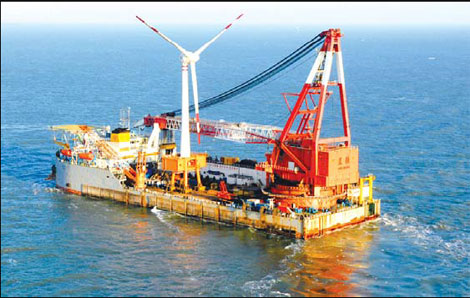Green China
Quest for green growth
Updated: 2011-06-03 11:06
By Fu Jing (China Daily European Weekly)
At the same time, it is also imperative to develop a robust and reciprocal EU-China relationship in areas of low-carbon cooperation, co-development of technology, investment and service access, government procurement and intellectual property right(IRP) protection.
Christine Lins, secretary-general of the European Renewable Energy Council, says that by sticking to its commitment for sustainable development, China and the EU have laid the roadmap for high-level cooperation not only at the political level but also among enterprises.
"The cooperation is complementary," she says, forecasting that bilateral cooperation will be enhanced between China and Germany, Denmark, Italy and Spain in renewable energy.
|
 A wind power station on the East China Sea. Green energy will account for a larger proportion of China's energy consumption in the next five years. Provided to China Daily |
But the biggest gains could come from the nuclear energy sector, as China has vowed to press ahead with its plan to ensure clean energy supplies and reduce carbon emissions, even though there were doubts of a rethink after the recent nuclear crisis in Japan.
Even as it cements its cooperation with nations like France, Russia and other European countries, China will incorporate tougher safety measures while constructing and operating nuclear power plants.
Xu Yuming, deputy secretary-general of the China Nuclear Energy Association, says that though China will undertake a safety review of its atomic power plants, it will have little impact on expansion. The overall goal of increasing nuclear generation capacity to reach 70 gW by 2020, from 10.8 gW last year, is still achievable, he says.
On March 16 this year, China decided to withhold approvals for new reactors as regulators wanted to review safety procedures at existing plants. China has 14 operational nuclear reactors and is believed to be building at least 26 more.
Xu says that China must develop its nuclear power sources further and reduce dependence on coal. He expects that China may have 200 gW of nuclear power capacity by 2030 and 400 gW by 2050 with nuclear power likely to account for 15 percent of the nation's energy mix by 2050.
France has already stepped up its pace of nuclear cooperation with China. French officials have in recent times been hard selling the Evolutionary Power Reactor (EPR) technology to China with assurance that the reactors can withstand missile hits.
Compared with existing nuclear reactors, the EPR is configured with four heavy security systems and has a double protective shell that prevents possible damage to the reactor core. France and China have also agreed to cooperate in uranium mining ventures.
China and Russia have also agreed to expand their nuclear cooperation in seven areas, which include building and exploring uranium mines, floating power plants, eliminating old plants and developing markets abroad.
The Moscow Times reported that both countries have also agreed to cooperate on molten-core catcher technologies, which improves nuclear safety.
European enterprises are also expecting that China will continue its nuclear programs. Olof Faxander, president of Swedish engineering group Sandvik, sees the development of nuclear power as one of its important business opportunities in China in spite of the nation's current suspension of approvals for nuclear projects.
Since 2009, the Swedish industry group has provided parts to Shanghai Electric Nuclear Equipment Co Ltd and Harbin Electric Nuclear Equipment Co Ltd. The deliveries will be concluded by 2013 and are valued at more than $300 million.
Faxander said in a previous interview: "I personally believe nuclear energy can be a very good and safe energy source for China to reduce its development costs in the long term."
Specials

Room at the inn
The Chinese hotel industry experiences a building boom, prompting fears of oversupply.

Pearls of wisdom
Chinese pearl farmers dominate the world market but now want to work smarter, not harder

Truly a super woman
Li Yuchun first came to prominence in 2005 as the Super Girl winner, and since then has become an international star.